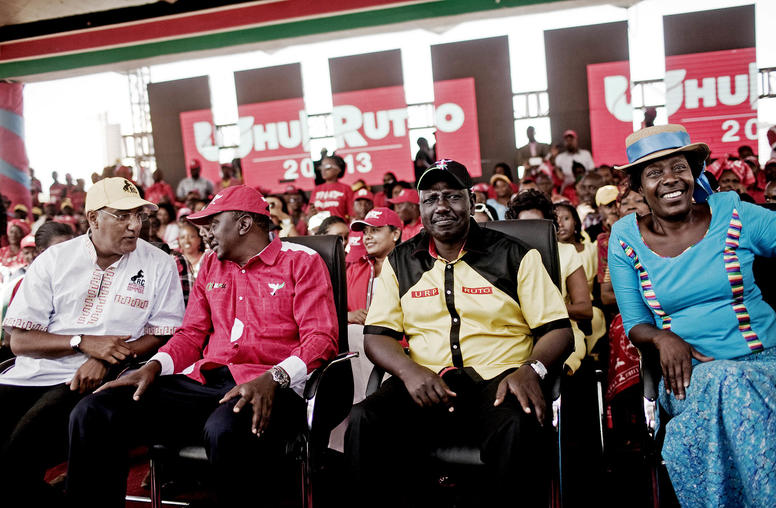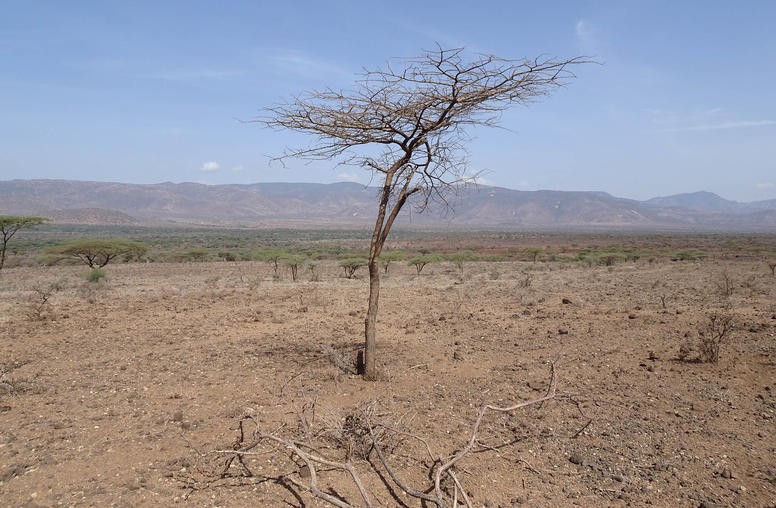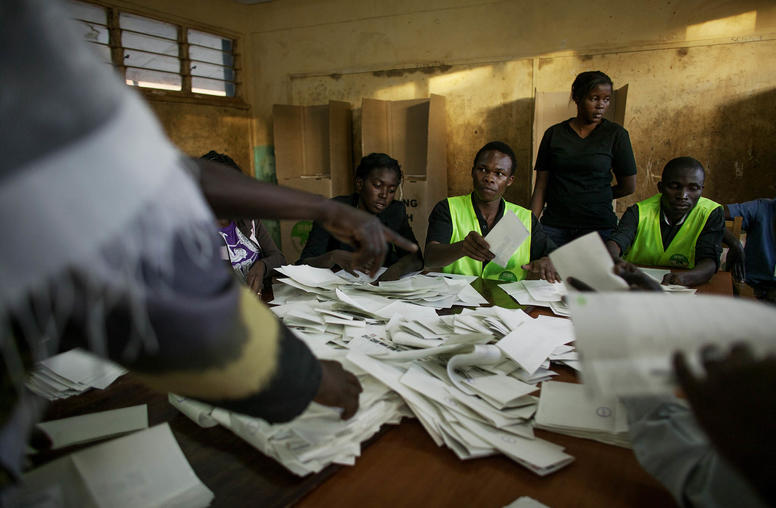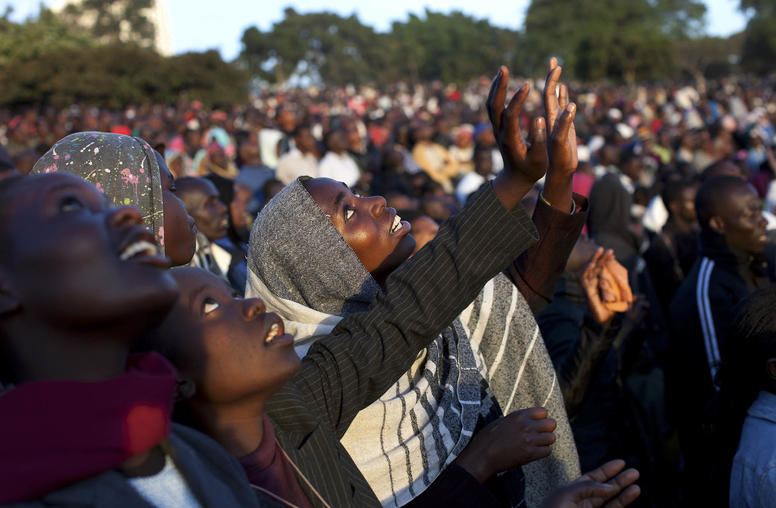On the Issues: Kenya
Dorina Bekoe and Jacki Wilson discuss the renewed violence in Kenya, sparked by a flawed electoral process.

Image on right: Kenyans reach out to receive food aid in the Kibera slum in Nairobi. (AP Photo)
The current violence in Kenya erupted after the national electoral commission proclaimed Mwai Kibaki, the incumbent, the winner of the presidential poll. In contrast, the opposition candidate, Raila Odinga, claimed that the election results were fraudulent and stated that he in fact won the contest.
In the aftermath of this flawed process, Kenya, once viewed as a relative haven of stability in Africa, now faces spasms of ethnic violence, a growing humanitarian crisis, economic disruption, and unresolved questions about its future political direction. Concerned over the prospect of heightened fragmentation, the African Union, spurred by the international community, has launched mediation efforts.
 Dorina A. Bekoe is a senior research associate in the Center for Conflict Analysis and Prevention, where she specializes in African conflicts, political development, institutional reform, and peace agreement implementation.
Dorina A. Bekoe is a senior research associate in the Center for Conflict Analysis and Prevention, where she specializes in African conflicts, political development, institutional reform, and peace agreement implementation.
 Jacqueline H. Wilson is a senior program officer in the Institute’s Education and Training Center/International. While serving at the U.S. Embassy in Nairobi, she was an international observer for the Kenyan elections of 2002.
Jacqueline H. Wilson is a senior program officer in the Institute’s Education and Training Center/International. While serving at the U.S. Embassy in Nairobi, she was an international observer for the Kenyan elections of 2002.
In this interview, both specialists provide their unique insights into the current situation.
- How has the situation changed in recent weeks?
- What is the backdrop to the current Kenya conflict?
- Why the eruption now?
- Why was there such a marked discrepancy between the results of the parliamentary elections, in which the opposition won two-thirds of the seats, and the significantly closer results for the presidential elections?
- To what extent does the imbroglio reflect other ethnic conflicts in Africa?
- What is the role of USIP in forestalling electoral violence worldwide? What are some "lessons learned"?
- How will the destabilization impact U.S. military, economic, and diplomatic presence in Kenya?
- If the crisis continues, what could the humanitarian impact be?
- With the African Union trying to broker a power-sharing agreement, it seems like a bellwether moment for the regional grouping. If such efforts are successful, what sort of precedent might these AU efforts set in Africa writ large?
- Can you reflect on your experiences in Kenya during the 2002 presidential elections?
Image on right: Opposition supporters display their machetes and other weapons during ethnic fighting in Kenya on Jan. 29, 2008.(AP Photo)
 How has the situation changed in recent weeks?
How has the situation changed in recent weeks?
Bekoe:
The violence in Kenya continues, but the mediation effort between the government and the opposition Orange Democratic Movement (ODM) has begun. This week two ODM parliamentarians were killed: on January 29, Embakasi MP Melitus Mugabe Were was killed at the gates of his house; on January 31, Ainamoi MP David Kimutai Too was killed by a police officer. In each case, the killings were interpreted as political—though there are questions about the Too murder. Raila Odinga, leader of the ODM, has particularly denounced the killings as politically motivated. In each case, widespread rioting followed the announcement.
Concurrently, the mediation by African Union Special Envoy Kofi Annan began in Nairobi. The major issues on the agenda included:
- devising a plan to stop violence immediately and restore fundamental human rights and liberties;
- addressing the humanitarian crisis and the needs of displaced people;
- devising a plan for national reconciliation;
- discussing power sharing options, constitutional review, and electoral commission reform;
- developing long-term strategies for durable peace.
The volatility of the situation—as evidenced by the spontaneity of the riots—makes the mediation environment all the more difficult and the responsibilities of the leaders much greater. Thus, while visible concrete progress on political reform must take place to convey the promise of peace, it is equally important for the leaders to reach out to their supporters directly and appeal for calm.
The invitation by the Nairobi police to allow a representative of ODM to join the investigation of the Were killing is an important step in creating a transparent process. The same opportunity should be extended for the investigation of the Too killing. In these tense times, actions that convey a credible commitment to reducing tension are very important.
The international and continental communities will be important in demonstrating the seriousness of the need to resolve the crisis fairly and quickly. Already, some members of the international community have followed through on their promise to suspend development assistance should the crisis continue; donors have suspended approximately $41 million to the Governance, Justice, Law and Order Sector Reform Program. The African Union, which meets this week in Addis Ababa for its annual summit, must take commensurate action to convey its resolve in upholding democratic principles.
What is the backdrop to the current Kenya conflict?
Bekoe:
Kenya has approximately 40 ethnic groups, none of which is a majority. The Kikuyu comprise a plurality, with 22 percent. Daniel arap Moi, Kenya’s president from 1979 to 2002, was from the Kalenjin group—11 percent of the population—who were considered his supporters. In contrast, the Kikuyu have been seen in the opposition to the Kalenjin. Still, while the violence in Kenya has taken on an ethnic tone, it is not correct to classify the roots of the violence (in both the current and past elections) as wholly ethnically based.
Political violence in Kenya has had an ethnic dimension. Before and after the 1992 elections, the first multiparty ones in Kenya, the Kalenjin clashed with the Kikuyu, killing approximately 1,500 people. A government inquiry revealed that Kenya’s politicians were involved in exploiting existing grievances and fomenting violence. Before and after the 1997 polls, ethnic violence in the Rift Valley, in western Kenya, and Coast Province, in eastern Kenya took the lives of nearly 200 people and displaced thousands. Once again, political figures were implicated in the violence.
The present violence also has an ethnic dimension. Both Odinga, a Luo, and Kibaki a Kikuyu, have accused the other of ethnic cleansing. But as the polls from the parliamentary elections indicate, Kenyans did not vote on entirely ethnic grounds. The Nairobi Peace Inititiave – Africa, which has partnered with USIP in the past, is working with other entities to organize sessions on dialogue and reconciliation to quell the tension and violence.
Wilson:
Kenya is a relatively young democracy. As Dr. Bekoe mentioned, 1992 was their first multiparty election following forty years under the ruling KANU party. It was only after President Moi essentially anointed Uhuru Kenyatta in 2002 as his successor to lead KANU that the possibility of political change in Kenya really took off. The backlash at that time was against a single ruling party, against "hereditary" government, and against control of power in a single ethnic group. But this transformation to real power sharing among all Kenyans has not been realized.
Wilson:
In 2002 the two largest opposition parties, one lead by Kibaki and the other lead by Odinga, formed an alliance, the National Alliance Rainbow Coalition, shortly before the election after the realization that neither could defeat KANU alone but together they could. The agreement was rumored to include a plan for constitutional changes providing power-sharing among the opposition. The opposition swept to power and defeated KANU with a groundswell of grassroots support under this alliance. But Kibaki was never the ruler people hoped he would be. Corruption persisted as a formidable challenge, and the alliance fell apart after the long-promised constitutional revisions of 2005 failed to produce real power-sharing. There is almost certainly lingering but real resentment among Odinga supporters over this failure.
In addition, the Rift valley provinces where we have seen much of the violence this election cycle have a history of election-related violence, and the scars of that past violence have never really healed.
Bekoe:
One can speculate that the results reflect the controversies that the Kibaki government has endured in the past few years. There was the high profile resignation of John Githongo, the Permanent Secretary in charge of Governance and Ethics – in 2005 due to the high level of corruption in the Kenyan government. There is also dissatisfaction with the pace and scope of constitutional reforms, among other grievances.
Wilson:
This is an excellent question that any inquiry into election results will surely examine closely.
To what extent does the imbroglio reflect other ethnic conflicts in Africa?
Bekoe:
Because of the power of the presidency, many elections in Africa are seen as winner-take-all for the ethnic group that prevails. As such, elections become zero-sum events.
Wilson:
In many countries, political affiliations become an identity marker that is often closely linked to traditional tribal affiliations. The intolerance of different identity groups often reflects control of power and resources that is concentrated in a single identity group or alliance of identity groups.
Bekoe:
Over the past two years, I have been collecting data on electoral violence in Africa—trying to understand when it happens, its triggers, and means to reduce tension. This work has highlighted which countries are at most risk for electoral violence and insights into strategies to lessen possibility of violence. To that end, USIP has organized workshops in Nigeria and Côte d’Ivoire that directly address the threat of electoral violence. Participants representing the media, democracy and development groups, and human rights organizations worked together to understand the conditions under which violence occurs or is avoided in other African countries. These efforts were undertaken in order to derive lessons for the participants’ countries. Such a comparative approach helps participants develop strategies and roles for different institutions to reduce the threat of electoral violence. Participants also take part in a simulation exercise, where they are given the opportunity to play different roles and devise a plan to lower the risk of violence during elections.
Recently, in Côte d’Ivoire, the vice president of the country’s Independent Electoral Commission attended the workshop. She opened the session, served as a speaker on a panel discussing democracy, and provided participants with the opportunity to verify their information in the voter registry. Moreover, she used the opportunity to invite civil society to work directly with the electoral commission to ensure a peaceful transition. Our partner organization in Côte d’Ivoire, the West Africa Network for Peacebuilding – Côte d’Ivoire, is currently working on voter registration with the electoral commission. I intend to stay in close contact to support their work.
The research and the fieldwork have yielded important lessons. In particular, while election day is usually free from violence, the periods before and after the elections are the most at risk for violence. One can speculate that the intensity of the international attention on election day reduces the probability of violence. More likely, however, the groundwork for rigging is laid long before the election day—this may take the form of fraud or intimidation, in extreme cases. Following the elections, weak institutions unable to manage conflict can trigger violence. Equally important, the work reveals that violence is rarely spontaneous. Political leaders have a critical role to play in stemming violence and reducing tension during the electoral period. It is imperative that they take decisive steps to indicate their intentions to resolve disputes peacefully. Finally, countries with deep ethnic grievances pose particular challenges. In these cases, electoral violence should be treated with the seriousness one devotes to resolving a civil war—reforming the electoral commission will not suffice. It is useful to have agreements, initiate dialogues, or devise reconciliation processes. Otherwise, the violence could recur as the ethnic grievances remain unresolved.
How will the destabilization impact U.S. military, economic, and diplomatic presence in Kenya?
Bekoe:
Despite the violence that has accompanied every election in Kenya, it has been a stable country in a war-torn region. Kenya has not been implicated in any of the region’s wars and its economy has grown steadily since 2002. U.S. businesses have invested $285 million in Kenya.
Kenya serves as an important country in the U.S. war on terrorism, due to the bombing of the 1998 U.S. embassy in Nairobi and Kenya’s willingness to act as a partner against extremists both within Kenya and in neighboring states. However, it is too early to tell how this destabilization will affect the U.S. military and economic partnerships. That will largely depend on how quickly Odinga and Kibaki can resolve the crisis.
Wilson:
Hopefully, this disruption will reinforce to the international community that democracy is a journey, not a destination. Large budgets for counter-terrorism do not necessarily build capacity in civil society or other arms of government. Just as it is hard to allocate funds for conflict prevention, it is difficult to focus on countries that do not present a crisis when there more compelling challenges competing for resources. But this crisis should remind us of the importance of this continued effort.
The challenge of overcoming ethnic animosity is daunting but not unachievable. It involves work in rule of law, transparency, human rights, development of democratic institutions, capacity building in civil society, economic development, and stability. This total package is related to people working together across ethnic lines to build their society in a way that shares resources and power. To me, this is the key to overcoming ethnic mistrust. It is a slow process. Social groups have developed bonds of trust, patronage and support that have persisted for a reason. Those bonds are not going to be overturned overnight. It is a long-term process of building trust through institutions that govern across ethnic boundaries.
If the crisis continues, what could the humanitarian impact be?
Bekoe:
The humanitarian crisis has so far largely been contained to Kenya, but this could change. Besides the approximately 255,000 Kenyans that have been displaced internally, nearly 3,000 have crossed into Uganda. It is imperative that international and local relief organizations recognize the regional nature of the crisis and work to coordinate responses.
Wilson:
Paradoxically, Kenya has long hosted camps populated by displaced persons and refugees from neighboring countries—including Somalia and Sudan—but now it has the challenge of caring for its own citizens in this way. The pivotal issue will be to ensure that any displacements are temporary. It would be quite harmful for the displacements to result in actual changes to the picture of diversity and tolerance for which Kenya is known.
Bekoe:
The African Union has already been active in convening belligerent parties to sign cease fire and peace agreements. One particular difference with Kenya is that it is considered a regional power—it is normally the country that sends envoys to unstable regions. For the African Union, a successful intervention in Kenya will demonstrate that it is beginning to develop its capacity to influence even key African countries. It would further the notion that the AU is truly a continental body.
Can you reflect on your experiences in Kenya during the 2002 presidential elections?
Wilson:
I was an international observer for the elections in 2002, serving in the Eldoret North constituency. On the way, we drove through towns called Moi’s Bridge, which demonstrated President Moi’s attempts to "claim" the area, and Burnt Forest. The excitement of the election was tangible as there were huge questions about how much rigging or intimidation there would be.
We were out before sunrise, and by the time the polls opened there were already long lines of voters. It was amazing how the voters queued equidistant, as if someone had spaced them a certain distance behind each other, and the lines were incredibly straight and orderly, as if the guide ropes were unnecessary. Many wore threadbare clothing, some were barefoot, and many were elderly or disabled, but they came to vote. Many walked, while the lucky ones came by bicycle or hitched rides on trucks. They brought children, had chickens tied to their bikes, and youth escorted ailing grandparents who voted for the first time. The polling stations were primarily elementary schools, with voting in largely spartan rooms with wooden tables and makeshift dividers crafted from sticks and fabric to screen the voters. You could see rooms stacked full of maize that would be used to feed the school children.
Each polling station I saw had a number of observers from the ruling and opposition parties, and there were many international observers from the USAID contingent, the European Union, the Carter Center, and others. When entering some polling stations there were about four or five young men standing near the entrance. They let us pass, but you knew that they might have been there to intimidate or "screen" voters opposing their view. We watched for signs of tampering, but honestly it was extremely challenging. By the end of the night, the observation process itself became even more challenging. The lighting was terrible, and ballots were dumped out on tables and sorted so quickly that we were unsure anyone was really paying attention.
Despite being told to vacate the premises after voting, masses of voters stayed outside the schools, waiting for the results from that polling station to be announced. The crowds were friendly and upbeat, with text messaged election jokes being translated for me by locals. After watching the counting at several polling stations, we followed some of the ballot boxes being transported to the counting station. There were rumors that the reason the counting station was down a lonely road, across a bridge, and up a hill at a remote school was to ripen the chance for foul play along the way (such as pushing ballot boxes in the river), but we saw no indication of such. By 3 AM, as each precinct reported, it became more and more clear the opposition was prevailing. Kenyans involved in the counting procedure and escorting the ballots stayed until their results were read. By 5 AM, people were checking on precincts that still hadn’t reported, but the sense of change was palpable. By daybreak, there were trucks full of Rainbow Coalition supporters blasting music and celebrating their victory in the streets. There was this groundswell of happiness. All reports indicated a mostly free and fair election. On our exhausted return back to Nairobi, while passing the beautiful hills between Nakuru and Naivasha, the clearing clouds revealed a rainbow. It was a moving sign of a transformational moment, supposed to be the dawn of a new era in Kenyan history.
Despite recent events, I have not lost hope for Kenya. What this most recent election and the response demonstrates to me is that Kenyans are willing to " fight" for democracy. What they must accept is that this "fight" must be fought at the ballot box and in the courts. They must build a democracy that allows for disagreement and demand their leaders govern for all Kenyans, not just their supporters. The process takes time, and there will be bumps in the road along the way. The important thing is that Kenya remains committed to stay on the road to democracy.
The views expressed here are not necessarily those of USIP, which does not advocate specific policy positions.



